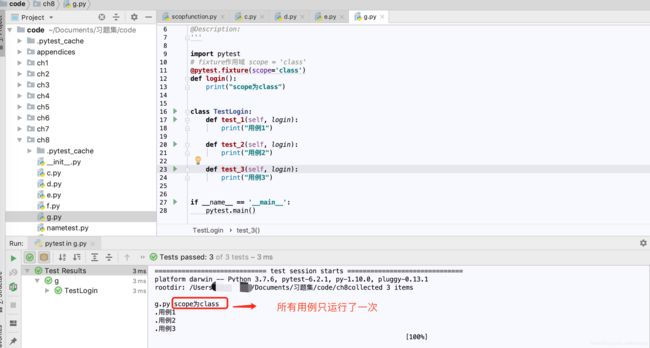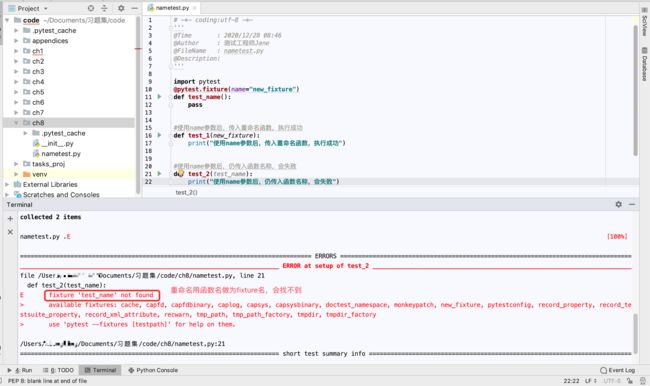6、Pytest之Fixture参数详解及使用
Fixture的调用方式:
@pytest.fixture(scope = "function",params=None,autouse=False,ids=None,name=None)
参数详解:
1、SCOPE:
- 用于控制Fixture的作用范围
- 作用类似于Pytest的setup/teardown
- 默认取值为function(函数级别),控制范围的排序为:session > module > class > function
| 取值 | 范围 | 说明 |
|---|---|---|
| function | 函数级 | 每一个函数或方法都会调用 |
| class | 类级别 | 每个测试类只运行一次 |
| module | 模块级 | 每一个.py文件调用一次 |
| session | 会话级 | 每次会话只需要运行一次,会话内所有方法及类,模块都共享这个方法 |
作用范围举例:
scope = "function"
语法:
@pytest.fixture()
#或者
@pytest.fixture(scope='function')
场景一:做为参数传入
# -*- coding:utf-8 -*-
'''
@Author : 测试工程师Jane
@FileName : d.py
@Description:
'''
import pytest
# fixture函数(类中) 作为多个参数传入
@pytest.fixture()
def login():
print("打开浏览器")
a = "account"
return a
@pytest.fixture()
def logout():
print("关闭浏览器")
class TestLogin:
#传入lonin fixture
def test_001(self, login):
print("001传入了loging fixture")
assert login == "account"
#传入logout fixture
def test_002(self, logout):
print("002传入了logout fixture")
def test_003(self, login, logout):
print("003传入了两个fixture")
def test_004(self):
print("004未传入仍何fixture哦")
if __name__ == '__main__':
pytest.main()
运行结果:
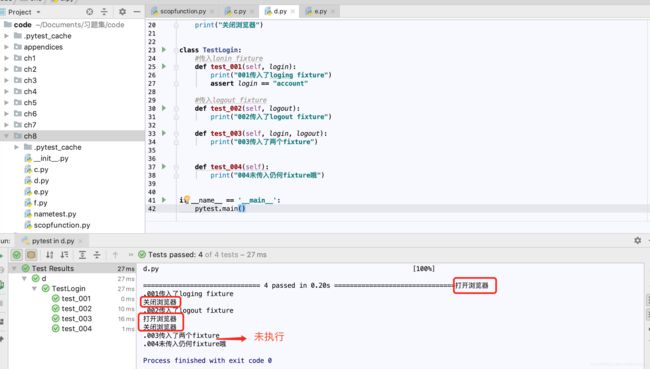
从运行结果可以看出,fixture做为参数传入时,会在执行函数之前执行该fixture函数。再将值传入测试函数做为参数使用,这个场景多用于登录
场景二、Fixture的相互调用
代码:
# -*- coding:utf-8 -*-
'''
@Author : 测试工程师Jane
@FileName : e.py
@Description:
'''
import pytest
# fixtrue作为参数,互相调用传入
@pytest.fixture()
def account():
a = "account"
print("第一层fixture")
return a
#Fixture的相互调用一定是要在测试类里调用这层fixture才会生次,普通函数单独调用是不生效的
@pytest.fixture()
def login(account):
print("第二层fixture")
class TestLogin:
def test_1(self, login):
print("直接使用第二层fixture,返回值为{}".format(login))
def test_2(self, account):
print("只调用account fixture,返回值为{}".format(account))
if __name__ == '__main__':
pytest.main()
运行结果:
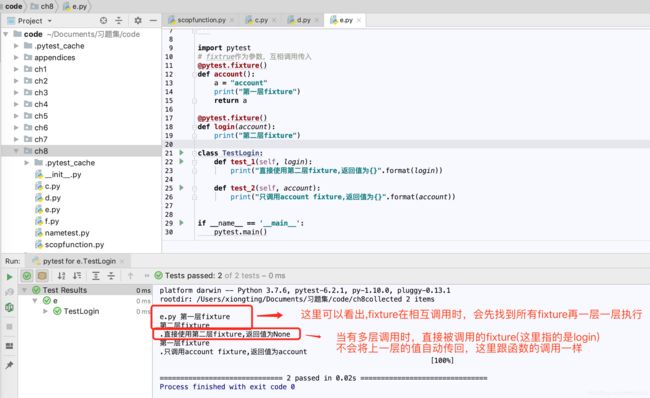
注:
1.即使fixture之间支持相互调用,但普通函数直接使用fixture是不支持的,一定是在测试函数内调用才会逐级调用生效
2.有多层fixture调用时,最先执行的是最后一层fixture,而不是先执行传入测试函数的fixture
3.上层fixture的值不会自动return,这里就类似函数相互调用一样的逻辑
scope = “class”:
- 当测试类内的每一个测试方法都调用了fixture,fixture只在该class下所有测试用例执行前执行一次
- 测试类下面只有一些测试方法使用了fixture函数名,这样的话,fixture只在该class下第一个使用fixture函数的测试用例位置开始算,后面所有的测试用例执行前只执行一次。而该位置之前的测试用例就不管。
语法:
@pytest.fixture(scope='class')
场景一、
# -*- coding:utf-8 -*-
'''
@Time : 2020/12/28 19:56
@Author : 测试工程师Jane
@FileName : g.py
@Description:
'''
import pytest
# fixture作用域 scope = 'class'
@pytest.fixture(scope='class')
def login():
print("scope为class")
class TestLogin:
def test_1(self, login):
print("用例1")
def test_2(self, login):
print("用例2")
def test_3(self, login):
print("用例3")
if __name__ == '__main__':
pytest.main()
# -*- coding:utf-8 -*-
'''
@Author : 测试工程师Jane
@FileName : 1.py
@Description:
'''
import pytest
@pytest.fixture(scope='class')
def login():
a = '123'
print("输入账号密码登陆")
class TestLogin:
def test_1(self):
print("用例1")
def test_2(self, login):
print("用例2")
def test_3(self, login):
print("用例3")
def test_4(self):
print("用例4")
if __name__ == '__main__':
pytest.main()
运行结果:
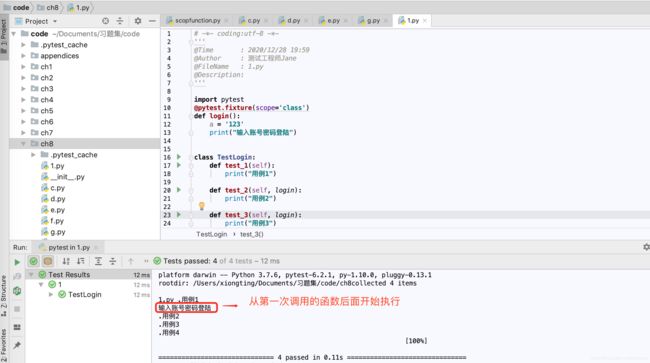
scope = “module”:与class相同,只从.py文件开始引用fixture的位置生效
# -*- coding:utf-8 -*-
'''
@Author : 测试工程师Jane
@FileName : 2.py
@Description:
'''
import pytest
# fixture scope = 'module'
@pytest.fixture(scope='module')
def login():
print("fixture范围为module")
def test_01():
print("用例01")
def test_02(login):
print("用例02")
class TestLogin():
def test_1(self):
print("用例1")
def test_2(self):
print("用例2")
def test_3(self):
print("用例3")
if __name__ == '__main__':
pytest.main()
运行结果:

scope = “session”:用法将在conftest.py文章内详细介绍
- session的作用范围是针对.py级别的,module是对当前.py生效,seesion是对多个.py文件生效
- session只作用于一个.py文件时,作用相当于module
- 所以session多数与contest.py文件一起使用,做为全局Fixture
2、params:
- Fixture的可选形参列表,支持列表传入
- 默认None,每个param的值
- fixture都会去调用执行一次,类似for循环
- 可与参数ids一起使用,作为每个参数的标识,详见ids
- 被Fixture装饰的函数要调用是采用:Request.param(固定写法,如下图)
举个栗子:

3、ids: - 用例标识ID
- 与params配合使用,一对一关系
举个栗子:
未配置ids之前,用例:

配置了IDS后:
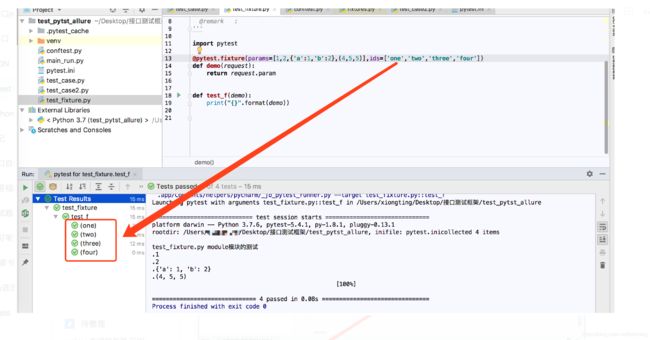
4、autouse: - 默认False
- 若为True,刚每个测试函数都会自动调用该fixture,无需传入fixture函数名
由此我们可以总结出调用fixture的三种方式:
1.函数或类里面方法直接传fixture的函数参数名称
2.使用装饰器@pytest.mark.usefixtures()修饰
3.autouse=True自动调用,无需传仍何参数,作用范围跟着scope走(谨慎使用)
让我们来看一下,当autouse=ture的效果:
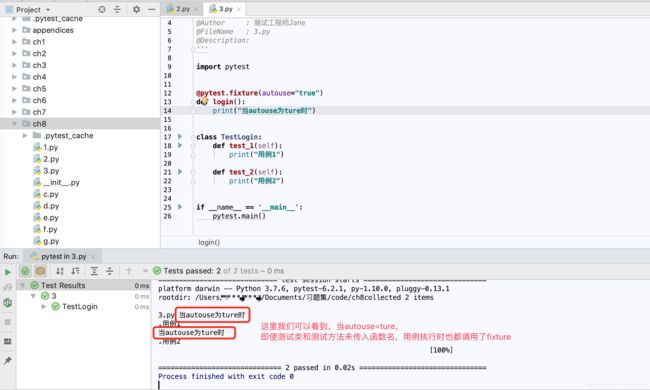
5、Name:
- fixture的重命名
- 通常来说使用 fixture 的测试函数会将 fixture 的函数名作为参数传递,但是 pytest 也允许将fixture重命名
- 如果使用了name,那只能将name传如,函数名不再生效
- 调用方法:@pytest.mark.usefixtures(‘fixture1’,‘fixture2’)
举栗:
# -*- coding:utf-8 -*-
'''
@Author : 测试工程师Jane
@FileName : nametest.py
'''
import pytest
@pytest.fixture(name="new_fixture")
def test_name():
pass
#使用name参数后,传入重命名函数,执行成功
def test_1(new_fixture):
print("使用name参数后,传入重命名函数,执行成功")
#使用name参数后,仍传入函数名称,会失败
def test_2(test_name):
print("使用name参数后,仍传入函数名称,会失败")
写在最后
以上为Fixture的部分使用详解,纯属个人理解,有部分内容参考此篇博文,感谢大佬的分享https://www.cnblogs.com/liudinglong/p/12885632.html
转载请注明出处
